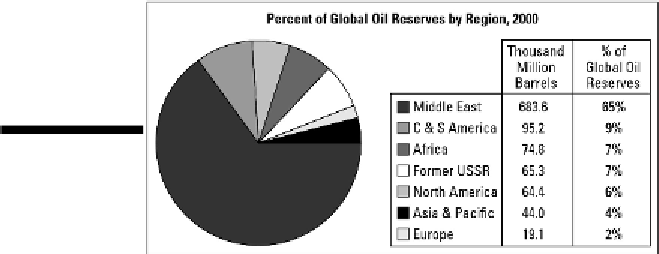Geography Reference
In-Depth Information
Figure 16-2:
The
geography
of
petroleum
re-
serves.
Resources and wealth
You may expect countries that possess lots of natural resources to be better off than those that don't.
For better or worse, however, it doesn't always turn out that way by a long shot. In fact, some poor
countries are rich in natural resources while some rich countries are poor in natural resources. This
difference may occur for a number of reasons, perhaps the most important of which concerns the loc-
ations of people and facilities involved in the acquisition and processing of raw materials.
Turning to another resource for a moment, consider the geographical differences in employ-
ment and income that may occur when trees in “Country A” are cut downand sent to “Country
B” for processing. Several people may be involved in harvesting the forest, from which timber
is sent to a sawmill in “Country B.” Many more people may be employed at a sawmill, where
raw logs are cut into pieces of lumber, than were employed back in the forest of “Country A”
to cut the trees. Also, because the factory employees are skilled workers, they are likely to
command higher salaries as well. Later, skilled craftspersons might take pieces of that lum-
ber and make high-priced furniture. Finally, company executives negotiate sales and contracts
with transportation firms, wholesalers and retailers concerning the final disposition of finished
products.
Thus, a single log can generate income for several people. But the amount of income and the location
of the beneficiaries varies. Generally, the person who cuts down the tree probably earns less than
the sawmill worker, and so forth. Therefore, in this example, the exported log generates much more
wealth where it is processed and made into finished products than where it was harvested.



